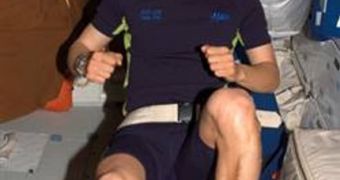Other than living with the stress of being several hundred miles above the surface of the planet, there are other problems that affect the crew members of the International Space Station as well. During their six-month stay on the laboratory, they have to maintain a strict code of hygiene, so as not to embarrass themselves in front of their colleagues, and to ensure that the atmosphere on the ISS remains breathable. But the newest member of the crew, JAXA astronaut Koichi Wakata, might seem like he's disregarding these norms, as he will remain with the same clothes on for up to a week.
However, this is not because he is lazy, but because he is testing a new variety of outfits, called “smell-free clothing,” which prevents the body from producing sweat. In addition, it absorbs forming water and insulates the body very well. If the clothes get wet, they dry in less than 5 minutes, and are also flame-resistant.
But one of the most important features is that they are anti-static, which is extremely important when dealing with electrical equipments, especially aboard the ISS, where they perform experiments that cannot be replicated anywhere else on Earth.
The Japan Women's University in Tokyo has been responsible with creating the new outfits, which include everything from T-shirts to underwear and socks. Researcher Yoshiko Taya has led the team that has produced these clothes, which have been previously tested on other shuttle missions as well.
They have received praises every time, and now Japanese officials want to see how they perform during extended stays. Because water is in limited amounts on the ISS and it's expensive to ferry fresh one, clothes are usually worn for about 3 days before being discarded. If the new design proves to perform well, then all astronauts could benefit from new sets of outfits that don't need changing for up to a week.
Japanese officials say that partner states will receive their own odor-free space suits as soon as research and development is finished in the Asian nations. At that time, the other 15 countries involved in the $100-billion project will benefit from this innovation, which will come in very handy come May, when the crew aboard the ISS will increase to six members, instead of three.

 14 DAY TRIAL //
14 DAY TRIAL //